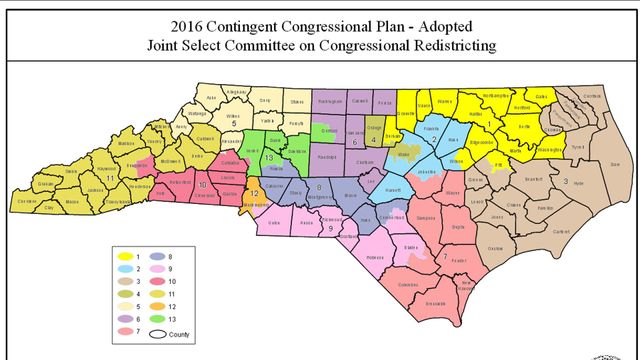Rush to redistrict renews push for independent panel to draw maps
As state lawmakers try to beat a court-ordered Friday deadline to redraw North Carolina's congressional map, some people are again asking why lawmakers are even involved in the process of configuring voting districts.
Posted — UpdatedA panel of three federal judges ruled Feb. 5 that lawmakers relied too much on the race of voters in 2011 when they drew the 1st Congressional District and the 12th Congressional District, and they gave the General Assembly two weeks to come up with a new plan. Gov. Pat McCrory has called a special legislative session for Thursday so lawmakers can approve a Republican proposal that completely ignores the race of voters and relies instead on the results of recent elections to guarantee the GOP maintains its 10-3 edge among North Carolina's 13 U.S. House members.
Gerrymandering – letting politicians choose their voters – is nothing new. Both parties have done it for decades nationwide.
Mark Nance, an assistant professor in North Carolina State University's School of Public and International Affairs, said North Carolina perpetually ranks first or second worst in the nation for gerrymandering.
"This is the result of a fairly disastrous and disorganized system of redistricting that's been in place for way too many years here in North Carolina," Nance said Wednesday.
While some say no one complained about gerrymandering when Democrats were in charge, Jane Pinsky, director of the North Carolina Coalition for Lobbying and Government Reform, said she and others have pushed lawmakers for years to pass independent redistricting.
"It's a system that's broken, and it's broken regardless of which party's in charge," Pinsky said.
When Democrats were in charge, Republicans backed independent redistricting, including Reps. Paul Stam, R-Wake, and David Lewis, R-Harnett, and former state budget chief Art Pope. Once the GOP took over, Democrats took up the call for independent redistricting, while the same Republicans who once sought to change the system began to say it's fine as is.
"When you're in power, you want to stay in power, and you think the system's worked in the past to keep the party in power in power, so you don't want to change it," Pinsky said.
In 2011, the state House passed an independent redistricting bill with overwhelming bipartisan support, but state Senate leaders refused to take it up.
There are other ways to create voting maps. In Iowa, for example, nonpartisan staffers draw districts based on population and geography with no access to voting data or where incumbents live.
Critics say politics can never be removed entirely from redistricting, but Pinsky and John Hood, chairman of the John Locke Foundation, a conservative think tank, said an independent process would be an improvement.
"Regardless of whether you’re a Republican or a Democrat sitting in the General Assembly in 2016, you ought to consider redistricting reform to ensure that, no matter what happens in the 2020 election, your party is not going to be artificially reduced in power, which is what redistricting does," Hood said.
"We think they should want an insurance policy that says we're never going to be the party out of power being dumped on by the party in power, regardless of which party you are," Pinsky said.
Related Topics
• Credits
Copyright 2024 by Capitol Broadcasting Company. All rights reserved. This material may not be published, broadcast, rewritten or redistributed.






